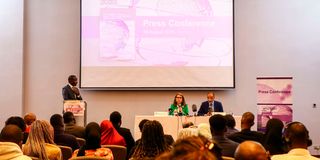Gender trade gaps persist globally, statistics show

The launch of the Economic Development in Africa Report 2023 at Radisson Blu Hotel, Nairobi, on August 16, 2023. A pilot project has confirmed the existing gender gaps in trade in Kenya and six other countries.
What you need to know:
- The findings by the United Nations Conference on Trade and Development were presented last Wednesday during a session of the 9th UN Global Forum on Gender Statistics.
- The project found that across Kenyan trading companies, women employees accounted for about 35 per cent of the total employees.
A pilot project has confirmed the existing gender gaps in trade in Kenya and six other countries.
The findings by the United Nations Conference on Trade and Development (Unctad) were presented last Wednesday during a session of the 9th UN Global Forum on Gender Statistics.
The project found that across Kenyan trading companies, women employees accounted for about 35 per cent of the total employees. It also revealed a gender pay gap, with men, on average, earning 21 to 27 per cent more than women.
Additionally, it found that men accounted for 72 per cent of the total number of owners of trading companies.
“These indicators can inform gender-responsive policymaking by identifying challenges and opportunities to promote gender-inclusive value chains,” said Cynthia Chelimo, who works for Kenya’s State Department for Trade.
Microdata
The methodology entailed a process called microdata linking, which offers a cost-effective and sustainable alternative to creating new one-off surveys.
The Kenya National Bureau of Statistics (KNBS), for instance, cooperated with the Kenya Revenue Authority because KNBS has no access to trade microdata because of Kenya’s confidentiality policies.
The cooperation allowed for the linking of data from the authority’s customs database to its administrative tax data, and once completed, an anonymised dataset was handed over to KNBS for analysis.
The pilot project was a result of a collaboration between Unctad, the UN Economic Commission for Europe and the UN Economic Commission for Africa to harness data.
The project aimed at developing the existing statistical data on employment, wages and salaries, as well as turnover, productivity and profitability of businesses from the gender perspective.
“These data also enable the assessment of the effects of Covid-19 through trade, including by different types of businesses such as small and medium enterprises and by gender,” Unctad said in a statement.
The project will advance the use of evidence as a basis for gender-responsive trade policy and in support of the economic and social recovery from Covid-19.
Georgia
Results from Georgia, which also presented its findings during the Global Forum, showed fewer women than men employed in trading enterprises, with women earning 30 to 35 per cent less. Men’s ownership of businesses was found to be about nine times higher than women's for businesses that import and export, five times higher for those who only import, and three times more for exporters.
“Gender aspects of trade statistics become very relevant to addressing issues related to welfare and equality. There’s high interest from state institutions, international partners and non-governmental organisations,” said Gogita Todradze, the executive director of Georgia’s National Statistics Office.
The other countries that were included in the pilot were Cameroon, Kazakhstan, Senegal and Zimbabwe.
Following the testing of the framework in the six countries, the methodology has now been outlined in Unctad’s newly published guidelines for the measurement of gender-in-trade statistics, aimed at helping national statistical offices to enhance data to inform trade policy development.





